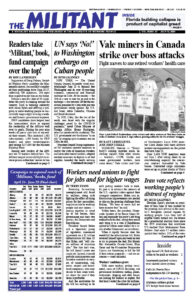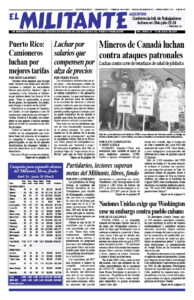Ebrahim Raisi’s election as president of Iran June 18 was marked by the growing lack of trust in the country’s bourgeois clerical regime by working people. Less than half of eligible voters turned out, the lowest for a presidential election there since the 1979 revolution that overthrew U.S.-backed Shah Mohammed Reza Pahlevi. And some 3.7 million voters spoiled their ballots, 13% of the votes cast, close to three times any previous election.
The victory of Raisi — a close ally of 82-year-old Supreme Leader Ayatollah Ali Khamenei and firm supporter of the country’s notorious Islamic Revolutionary Guard Corps — was a foregone conclusion. The Guardian Council, which oversees Iran’s elections, disqualified most of his potential competitors, including former President Mahmoud Ahmadinejad and former Speaker of the Parliament Ali Larijani, approving only seven candidates. Three of them dropped out in the final days of the race, helping ensure Raisi’s victory with 62% of the vote.
The election assures that the course of the country’s capitalist rulers to export their counterrevolutionary political sway at home and through the region will continue. These policies have led to protests and strikes across the country over the last three years.
Hundreds of temporary workers hired by subcontractors at oil, refinery and power stations run by the National Iranian Oil Company went on strike in eight provinces across the country just days after the vote. They are demanding higher wages, payment of back wages and 10 days off after every 20 days of work.
According to Iran’s semiofficial Iranian Labour News Agency, “Being entrusted to a contractor is one of the nightmares of workers in Iran.” Contract bosses impose 12-hour and even 16-hour days on the workers, conditions are unsafe, food and housing is inadequate, “and sometimes workers don’t get paid for months,” said labor activist Nasser Aghajari. “Workers should be allowed to form a union.” Permanent employees are backing the strike.
The capitalist rulers and their media in the U.S. portray the regime in Iran as if it represents the continuation of the 1979 revolution that deposed the shah’s dictatorship. That was a deep-going, modern, popular social revolution in city and countryside that wrought far-reaching advances for workers, women and Iran’s oppressed nationalities. But it didn’t succeed in bringing to power a government of workers and farmers.
Instead, a clerical bourgeois-dominated counterrevolution — a coalition of rival middle class and bourgeois factions — pushed back the toilers.
But the only way that regime can try to maintain itself in power is to extend its reactionary influence through the region, in Iraq, Syria, Lebanon, Yemen and divided Kurdistan, a course backed by all of the regime’s factions. It calls for the destruction of Israel and for driving the Jews out.
The Iranian rulers live in fear of the working class. Massive protests by working people — taking advantage of divisions in ruling circles — swept the country in December and January 2017-18 and again in November 2019. These were fueled by rising discontent among working people, whose children the regime used as cannon fodder in its foreign interventions at the same time they were forced to pay for the capitalist economic crisis, exacerbated by U.S. sanctions. Inflation today is 40%. This unrest was reflected in a sharp drop in electoral participation.
One reflection of that fear of working people is the widespread use of the death penalty for both political and criminal offenses. At least 267 people were executed in 2020. While down from 972 in 2015, that’s still more than anywhere else except China, which has more than 15 times the population of Iran.
Raisi, a long-standing judicial official, served on a 1988 commission that organized the “extrajudicial execution” of thousands of regime opponents.
While campaigning, Raisi tried to portray himself as a friend of working people and opponent of corruption. The state-run Islamic Republic News Agency reported that in Ahvaz, in oil-rich southwestern Khuzestan province, residents handed him letters describing their economic hardships. Raisi promised the crowd that he would focus on solving problems.
The election took place as the administration of Joseph Biden is pushing to draw Tehran into reinstating the U.S.-Iran nuclear deal agreed to by Barack Obama in 2015. Donald Trump withdrew Washington from the agreement in 2018.
Raisi said Tehran is willing to abide by the limits on producing nuclear materials if Washington lifts “all oppressive sanctions against Iran” first. He also said Iran’s ballistic missile program is “not negotiable.” Nor is its support to its allies in the region, a reference to armed Iranian-backed militias.

